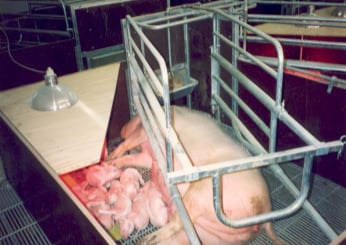
“My Facebook feed looks pretty different to yours,” a cotton farmer told me over the phone.
“On Sunday, it was full of rumours and full of fear. We knew something was coming.”
It was all just speculation at that point, a turbulent rising fear amongst Australian farming communities – friends of friends hearing whispers that a huge protest was brewing.
“Families were going to bed scared,” the farmer explained.
The rumours were right.
On Monday morning, vegan activists staged nationwide protests.
On the topic of farming, who are Australia’s invisible farmers? Listen below. Post continues after podcast.
They hid inside abattoirs in the dead of the night and chained themselves to machinery.
They were wearing black, and holding signs that read ‘Watch Dominion,’ a documentary exploring animal farming in Australia.
It’s not the first time farmers have felt victimised. In fact, Mamamia struggled to find farmers who would go on the record to talk about this topic, fearing retribution.



Top Comments
I'm not a vegan nor vegetarian. I followed the Live sheep export scandal. Vegans claim that animals are being bludgeoned to death and people are butting out their cigarettes on sentient creatures. This is wrong. Secret, illegal footage is the only way evidence of this type of cruelty is collected. I eat meat and animal products. I believe it when farmers say they are/were shocked by the report on the mistreatment of sheep during live export. I don't believe it when abattoirs and farmers claim that they are all humanely killing their animals. Clearly some aren't. I won't stop eating meat, but I want to see more monitoring of animal well-being. Vegan activists seem to be the only ones who are campaigning for this.
Disclaimer: all animal rights campaigners should comply with the law and definitely not threaten or intimidate workers and their families.
I believe we should always be looking at our animal welfare and examining where we can be acting in a more ethical, and humane way. However, intimidating and attacking farmers who generally as a rule care for their animals well and also to the letter of the law is WRONG. Petition your local members, protest at parliament, go for it! Try and change the law if you want, but Stop harassing innocent people at their workplace. Stop intimidating people. It’s disgusting.
I like Vegans. I mean, I couldn't eat a whole one, but they are very nice.